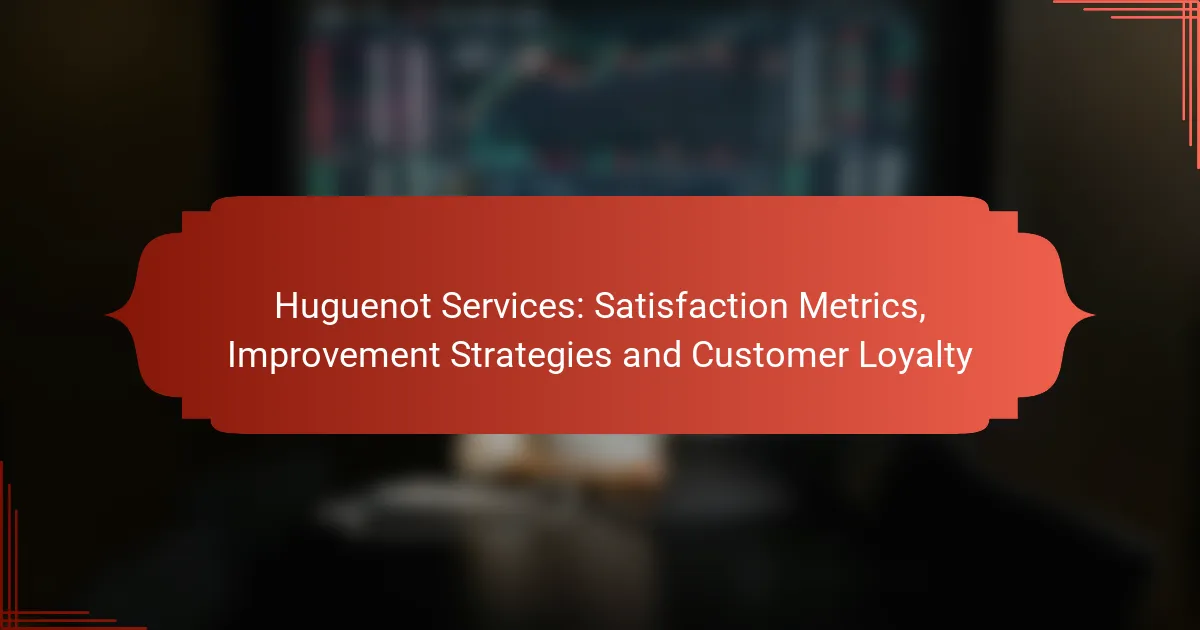Huguenot Services prioritizes customer satisfaction by employing various metrics that reveal valuable insights into client experiences and perceptions. By focusing on staff training, feedback mechanisms, and CRM tools, the organization aims to enhance service quality and foster customer loyalty through improved relationships and personalized interactions.

How do Huguenot Services measure customer satisfaction?
Huguenot Services measure customer satisfaction through various metrics that provide insights into client experiences and perceptions. These metrics help identify areas for improvement and gauge overall loyalty.
Net Promoter Score (NPS)
The Net Promoter Score (NPS) is a widely used metric that assesses customer loyalty by asking clients how likely they are to recommend Huguenot Services to others. Responses are categorized into promoters, passives, and detractors, which helps in calculating the overall score.
A high NPS indicates strong customer loyalty, while a low score signals potential issues. Companies typically aim for an NPS above 50, which is considered excellent in many industries.
Customer Satisfaction Score (CSAT)
The Customer Satisfaction Score (CSAT) measures how satisfied customers are with a specific interaction or service. Clients are usually asked to rate their satisfaction on a scale, often from 1 to 5 or 1 to 10.
To effectively use CSAT, Huguenot Services should regularly collect feedback after key touchpoints, such as service completion or support interactions. A CSAT score above 80% is generally viewed as favorable.
Customer Effort Score (CES)
The Customer Effort Score (CES) evaluates how easy or difficult it is for customers to interact with Huguenot Services. This metric focuses on the effort required to resolve issues or complete transactions.
By asking customers to rate their effort on a simple scale, Huguenot Services can identify friction points in the customer journey. Lowering customer effort often leads to higher satisfaction and loyalty, with scores ideally below 3 on a 7-point scale.

What improvement strategies can enhance Huguenot Services?
Enhancing Huguenot Services requires a focus on training staff, implementing feedback mechanisms, and utilizing CRM tools. These strategies can lead to improved customer satisfaction and loyalty by addressing service gaps and fostering better relationships with clients.
Training programs for staff
Effective training programs are essential for equipping staff with the skills needed to deliver high-quality services. Regular workshops and seminars can help employees stay updated on best practices and customer service techniques.
Consider incorporating role-playing scenarios and real-life case studies into training sessions. This hands-on approach helps staff understand customer needs and develop problem-solving skills, which can significantly enhance service delivery.
Implementing feedback loops
Establishing feedback loops allows Huguenot Services to gather insights directly from customers. Regular surveys and follow-up calls can identify areas for improvement and highlight what clients value most.
Utilize both quantitative and qualitative feedback to create a comprehensive view of customer satisfaction. This information can guide service adjustments and foster a culture of continuous improvement within the organization.
Utilizing customer relationship management (CRM) tools
CRM tools are vital for managing customer interactions and data efficiently. By tracking customer preferences and service history, Huguenot Services can personalize experiences and anticipate client needs.
Investing in a robust CRM system can streamline communication and improve response times. Look for features that allow for automated follow-ups and detailed reporting to enhance service quality and customer loyalty.

How can Huguenot Services foster customer loyalty?
Huguenot Services can foster customer loyalty by implementing strategies that enhance the overall customer experience. Focusing on loyalty programs, personalized interactions, and consistent communication can significantly strengthen relationships with clients.
Loyalty programs
Loyalty programs are structured incentives that reward customers for repeat business. These programs can include discounts, points systems, or exclusive offers that encourage ongoing engagement. For example, offering a 10% discount after a customer’s fifth purchase can motivate them to return.
To be effective, loyalty programs should be easy to understand and accessible. Consider using digital platforms to track points and rewards, making it convenient for customers to engage with the program.
Personalized customer experiences
Creating personalized customer experiences involves tailoring services and communications to meet individual preferences. This can be achieved through collecting data on customer behaviors and feedback, allowing Huguenot Services to customize offerings. For instance, sending personalized recommendations based on previous purchases can enhance customer satisfaction.
Utilizing customer relationship management (CRM) tools can help in managing this data effectively. By analyzing customer interactions, Huguenot Services can identify trends and preferences, leading to more meaningful engagements.
Regular communication and engagement
Regular communication and engagement are crucial for maintaining customer loyalty. This can include newsletters, updates on new services, or personalized follow-ups after a purchase. Keeping customers informed fosters a sense of connection and trust.
Consider implementing a schedule for outreach, such as monthly newsletters or quarterly surveys to gather feedback. Engaging customers through social media platforms can also enhance interaction and keep the brand top-of-mind.

What are the key metrics for evaluating service quality?
Key metrics for evaluating service quality include First Contact Resolution (FCR), Service Level Agreements (SLAs), and response time metrics. These metrics help organizations assess how effectively they meet customer needs and expectations.
First Contact Resolution (FCR)
First Contact Resolution (FCR) measures the percentage of customer inquiries resolved during the first interaction. High FCR rates indicate efficient service and contribute to customer satisfaction, as customers prefer not to repeat their issues.
To improve FCR, training staff on common issues and empowering them to make decisions can be effective. Aim for FCR rates above 70%, as this is generally considered a benchmark for good service.
Service Level Agreements (SLAs)
Service Level Agreements (SLAs) define the expected level of service between a provider and a customer. They typically include metrics such as response times, resolution times, and availability, which help set clear expectations.
Establishing realistic SLAs is crucial. For example, a common SLA might stipulate that 80% of calls are answered within 20 seconds. Regularly reviewing and adjusting SLAs based on performance can enhance service quality.
Response time metrics
Response time metrics track how quickly a service team addresses customer inquiries. These metrics can include initial response times and total resolution times, both of which are critical for customer satisfaction.
To optimize response times, consider using automated systems for initial contact or triaging requests. Aim for initial response times within a few minutes for high-priority issues to maintain customer engagement and satisfaction.

How do Huguenot Services compare to competitors in Ireland?
Huguenot Services stand out in Ireland due to their commitment to quality and customer satisfaction, often outperforming local competitors. Their focus on tailored solutions and responsiveness to client needs sets them apart in a competitive market.
Benchmarking against local providers
When benchmarking Huguenot Services against local providers, key metrics include service quality, response time, and customer satisfaction ratings. Many local competitors may offer similar services, but Huguenot Services frequently achieves higher ratings in customer feedback, indicating a stronger alignment with client expectations.
For example, while many providers may take several days to respond to inquiries, Huguenot Services typically responds within a few hours, enhancing their competitive edge. This responsiveness is crucial in a market where timely support is often a deciding factor for clients.
Unique service offerings
Huguenot Services offers unique service packages that cater specifically to the needs of Irish clients, such as customized consulting and local expertise. These offerings are designed to address specific challenges faced by businesses in Ireland, making them more relevant than generic solutions from competitors.
Additionally, Huguenot Services incorporates innovative technologies that streamline processes, providing clients with efficient and effective service delivery. This focus on innovation helps to differentiate them in a crowded marketplace.
Customer testimonials and reviews
Customer testimonials for Huguenot Services frequently highlight their exceptional service and dedication to client success. Many clients report a high level of satisfaction, often citing the personalized attention they receive as a key factor in their loyalty.
Online reviews also reflect positive experiences, with numerous clients recommending Huguenot Services for their reliability and expertise. This strong reputation not only reinforces customer loyalty but also attracts new clients seeking dependable service providers in Ireland.

What role does technology play in improving Huguenot Services?
Technology enhances Huguenot Services by streamlining operations, improving customer interactions, and providing valuable insights through data. By leveraging automation and analytics, organizations can boost customer satisfaction and loyalty effectively.
Automation of customer interactions
Automation in customer interactions allows Huguenot Services to respond to inquiries and manage requests more efficiently. For instance, chatbots can handle common questions, reducing wait times and freeing up staff for complex issues.
Implementing automated systems can lead to significant improvements in service speed and consistency. Organizations should ensure that these systems are user-friendly and provide clear pathways for customers to reach human representatives when needed.
Data analytics for insights
Data analytics plays a crucial role in understanding customer behavior and preferences within Huguenot Services. By analyzing feedback and interaction patterns, organizations can identify areas for improvement and tailor their offerings accordingly.
Utilizing analytics tools can help track satisfaction metrics and customer loyalty indicators. Regularly reviewing this data allows organizations to make informed decisions that enhance service quality and meet customer expectations effectively.
